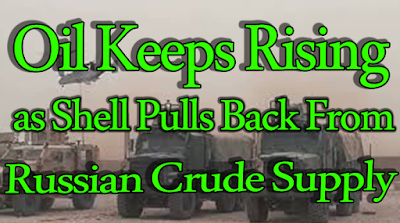 |
| VIDEO.. Oil Keeps Rising as Shell Pulls Back From Russian Crude Supply |
Shell claims that reducing Russian oil supplies will have an impact on processing.
WTI crude futures have risen beyond $123 following a 3.2 percent increase. Monday
Brent oil rose after European oil major Shell Plc declared it will cease importing Russian crude, while the International Energy Agency expressed dissatisfaction with market producers' conduct thus far.
London futures neared $127 a barrel, while West Texas Intermediate climbed after finishing at the highest level since 2008 on Monday. The rise in oil prices has contributed to increased retail fuel prices, with gasoline reaching a record in the United States, according to the American Automobile Association, highlighting the inflationary impact of increasing energy expenses.
Shell has stated that it will no longer buy Russian crude on the spot market and will not renew its term contracts unless ordered differently by governments. It also stated that it will restructure its crude oil supply chain to eliminate Russian quantities, which will take several weeks and result in lower throughput at certain of its refineries.
The concept of bipartisan legislation to prohibit Russian oil imports into the United States was unveiled by US senators, but European Union governments remain divided on whether to join the measure. TotalEnergies SE is the first major oil firm to officially state that its traders would no longer purchase Russian crude, Despite the fact that most purchasers are already avoiding its supply. The IEA's head stated that the agency can release extra supplies to cool prices if necessary, adding that it has been disappointed by producers' moves to stabilise oil thus far.
Because of the massive increase in oil prices since the outbreak of the conflict, several of Wall Street's biggest names have raised their price projections. Goldman Sachs Group Inc. now expects Brent to trade at $135 a barrel this year, up from $98 before. UBS Group AG believes that $125 is a soft ceiling for prices, but that they may rise to $150 in the event of a lengthy war.
The IEA stated that a "considerable quantity" of stockpiles may be released if necessary, and that there is a big amount of spare production capacity available.
"We could see a few corrections along the road, but this is ultimately heading way, way higher," Amrita Sen, chief oil analyst at consultant Energy Aspects, told Bloomberg TV. I would argue you need at least $150, if not more, to see a significant slowing in demand growth.
According to statements at CERAWeek by S&P Global in Houston, OPEC Secretary General Mohammad Barkindo cautioned that the world lacks adequate oil-production capacity to replace Russia's contribution to crude markets. At the same time, Chevron Corp. CEO Mike Wirth stated that there is no indication of physical oil or gas shortages at this time.
PRICES
- Texas's West At 10:47 a.m. in London, intermediate crude for April delivery was up 3% to $123.03 a barrel.
- Brent for May delivery rose 3.1 percent to $127 per barrel.
Cracks are beginning to appear in the oil markets as rising prices take their toll. Asia's plastic manufacturers are cutting back on production, while the region's refiners are exploring reductions in processing. Freight charges have also risen, putting further strain on refineries that had just recently recovered from the epidemic.

تعليقات
إرسال تعليق